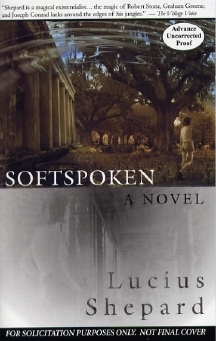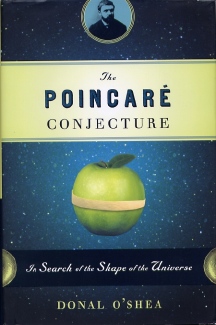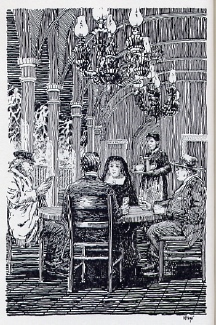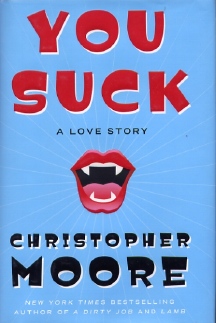Trashotron.com |
||
This Just In...News From The Agony Column
Preview for Podcast of Monday, March 19, 2007: Get ready to go.
Here's an MP3 preview of the Monday March 19, 2007 podcast for The Agony Column. Enjoy!
03-16-07: Lucius Shepard is 'Softspoken'
The Sun Shines Dark On My South Carolina Home
A novel is not a ghost, but it may haunt you. There's practically no beating the American south as a setting for horror novels. Lucius Shepard has visited this clime again and again, each time finding new horrors, new men and women whose psyches are a primordial soup of every fear and desire. 'Softspoken' (Night Shade Books ; May 16, 2007 ; $23.95) is his newest novel of Southern Gothic horror, a hallucinatory mix of very modern terrors and ancient family secrets. Shepard is one of America's best-kept secrets, a great writer who produces superb work every time out of the gate, yet seems to remain beneath the radar of American mainstream readers. It's the sort of thing that makes you want to scream, but writers like Shepard do break through, and when they do, books like this achieve a financial value that is nearly equal to their literary merit.
Sanie has moved with her husband Jackson into the Bullard family ancestral home in rural South Carolina, "a three story home that might have been featured in the real estate section of The Astral Times." Probably not a good sign, but then Sanie has other things to worry about. The Bullard family tree grows from twisted roots. Her husband Jackson has, after all, moved her into an antebellum mansion that has seen better days yet contains worse memories. Sanie thinks he might take after his father and that would not prove to be a good thing. Her sister-in-law Louise is "almost certifiable, pitiful in her inability to cope with the world." And Jackson's brother, Will is a real piece of work. He's the sort of fellow you ask how many buttons of peyote you’re supposed to take, but who knows that the other voice that Sanie hears in the house when she is alone is probably not one of the ghosts. None of this bodes well for anyone other than the reader.
'Softspoken' is the perfect definition of Southern Gothic. You've got one supposedly sane woman who winds up spending a lot of quality time in a large Southern home. Alone, except for the voices she hears, and the things she discovers; about the Bullard family, the small statuettes that might have appeared in a certain famous piece of pulp fiction, the stacks of unsavory reading material. She's alone with her mind in overdrive.
'Softspoken' is the perfect book to hand someone who thinks that they don’t write horror novels the way they used to "back in the day". Shepard's prose is rich and captivating, giving him an uncanny ability to hone in on his characters' fears, hopes, and nightmares. He brings them to life with atmospheric intensity, immersing the reader in a rich miasma that permeates your perceptions. He has an unerring ability to set up a scene of shocking revelation that reverberates long after the book is closed. 'Softspoken' is indeed soft-spoken. It is a subtle and powerful novel that perfectly encapsulates the Southern Gothic. Of the many novels that you may read in a lifetime, this particular hallucination will stay enmeshed in your memory. But those memories are not yours. The voice that whispers, speaking softly is not yours. It's not a ghost. But you are haunted.
03-15-07: Christopher Golden Joins 'The Borderkind'
Book Two of The Veil
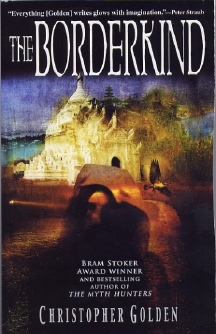
Corporations don't seem to mind doing their own bit of sampling now and again. Last year about this time saw the release of the first book in a new trilogy by Christopher Golden, 'The Myth Hunters'. I said then we could trust him to deliver and deliver he has, with the second book in the planned trilogy 'The Borderkind' (Bantam Spectra / Random House ; April 3, 2007 ; $12). Once again, we join Oliver Bascombe, your not-so-basic lawyer anymore. And once again, readers have reason to seek out a novel that delivers on promises of surreal supernatural scenes and complicated plots. 'The Borderkind' is a trade paperback that should go on your shelf as soon as it lands on bookseller's shelves. The cover design by Craig DeCamps is classy, and the trade paperback format is rather nice. Yes, Golden to my mind deserves hardcover first editions, but he's getting there.
With 'The Borderkind' we're well beyond setup, one of the reasons I like Golden's work so much. He doesn't mess around, but he doesn't just write one continual chase scene either. With 'The Borderkind' the layers of the world have been peeled back to reveal both wonder and danger. Wonder for the reader, who can submerse in the spectacle of legends brought to life and danger for Oliver Bascombe, who finds himself immersed in a mythic role he never knew he could fulfill.
'The Otherkind' offers Golden a chance to explore lots of mythic archetypes, to give them literary flesh and life. Having stumbled across the Veil that separates out world from the world of myth and legend, Bascombe is called upon help those incarnations survive a force that seeks to destroy them and thus undo our world as well. Bascombe has a huge stake in all this, which is why this series is so compelling. On the surreal side, we've got the legendary quest motif; meanwhile back in the supposedly real world, Bascombe's fiancée is working with a detective to find a serial killer who puts out his victim's eyes – and one of those victims is Oliver's father, while his sister has been kidnapped. The solution will not be amenable to ordinary methods of detection however – though they can play their part in the great game. Golden uses his strengths as a suspense writer to ground his surreal explorations and his strengths as a writer of the surreal to intensify his suspense. Striding between two worlds has its benefits.
Golden really has a great series going here, a wonderfully original take on the Otherworld, the world of Faerie, of Legend -- the literary equivalent to the Jungian subconscious, where the monsters swim with the memories. Golden excels at melding the real and the unreal, at keeping the toes tapping while letting his readers languish in the sometimes garish, sometimes understated Otherworld beyond the veil. He packs his work with detailed research on the archetypes an myths of many cultures, but doesn't bog it down. Simply put, he writes outstanding novels that should appeal to a broad audience that's willing to journey to the Otherworld. Given the state of things in this world, that audience is clearly significant and getting larger every day. While the fictional Otherworld may be in jeopardy in Golden's novel, I suspect that when they discover the Veil in reality they'll have to impose some pretty strict immigration laws.
But thankfully, books are the only passports most of us need to get to the Otherworld. Golden's novel is a fine method of transport, though compulsive types who like to hold back from starting a series until it is completed will have to wait just one more year to begin. It's pretty damn certain that Golden will be wrapping up his visit to the Otherworld then. But readers who enter can easily decide never to leave again.
03-14-07: Donal O'Shea Delivers 'The Poincaré Conjecture'
A Rubber Band Holding An Apple
"Revolutions in mathematics," writes Donal O'Shea, "are quiet affairs." But don’t take that to mean that they make quiet reading. 'The Poincaré Conjecture: In Search of the Shape of the Universe' (Walker & Company ; March 9, 2007 ; $26.95) may describe events in closed room, reasonable people behaving reasonably. But the impact of these events, the import of these events literally redefines our place in the universe.
Let's back up a bit, to the turn of the century. The Clay Mathematics Institute decides to spice up the math world by offering a million bucks a pop for the answers to seven not-so-simple math problems, including as they describe them, the Birch and Swinnerton-Dyer Conjecture, Hodge Conjecture, Navier-Stokes Equations, P vs NP, Poincaré Conjecture, Riemann Hypothesis, and Yang-Mills Theory. Heady stuff, both the bucks and the problems.
The problem is that when you inhabit a world of pure math, the actual world around you becomes correspondingly less important. Accolades for a solution to one of these problems are practically meaningless in the face of actually having solved the problem. Your first and best example of this is Grigory Perelman's solution to the Poincaré Conjecture, which I'll replay here from the Clay Institute website for your baffled enjoyment:
"If we stretch a rubber band around the surface of an apple, then we can shrink it down to a point by moving it slowly, without tearing it and without allowing it to leave the surface. On the other hand, if we imagine that the same rubber band has somehow been stretched in the appropriate direction around a doughnut, then there is no way of shrinking it to a point without breaking either the rubber band or the doughnut. We say the surface of the apple is "simply connected," but that the surface of the doughnut is not. Poincaré, almost a hundred years ago, knew that a two dimensional sphere is essentially characterized by this property of simple connectivity, and asked the corresponding question for the three dimensional sphere (the set of points in four dimensional space at unit distance from the origin). This question turned out to be extraordinarily difficult, and mathematicians have been struggling with it ever since."
Okey-dokey! Doughnuts in space, I geddit. But behind the math and all the conjecturing there are always men and women who do the conjecturing. We look at all sorts of histories in our lives; political and scientific, but math, so fundamental to our understanding of well, everything, is presented to us without any human context. 'The Poincaré Conjecture' give readers both a fundamental understanding of the math and a thorough understanding of the history, so that when we finally reach the point -- so recently arrived at -- when we achieve the solution and the human behind the solution proves to be every bit as mysterious and incomprehensible as the problem itself, at least we're prepared. One mystery is solved as another is presented.
O'Shea traces the history of the problem from the earliest beginnings of math itself. It begins with our understanding of the shape of the earth in Ancient Greece, then on to both Euclidean and non-Euclidean geometry. Cthulhu ftagn! Then we bump into the first instance of a Clay Institute problem, The Riemann Hypothesis, which gives a great idea of how math works. On June 10, 1854, Bernhard Riemann was giving his Habilation lecture, an academic rite of passage. There in the University of Göttingen, Riemann overturned three thousand years of geometry in a speech with almost no mathematical notation. It would take almost twenty years for the implications of his work to make their way into mainstream mathematics. A revolution was launched with no fanfare of foofaraw. In 19004, Henri Poincaré, offered up another poser, leaving humanity with a problem that it could not solve.
Fast forward to November 11, 2002, when Grigory Perelman published a paper on the Internet at www.arXiv.org. At first it seemed interesting and matter-of-fact, but it quickly became clear that Perelman had solved the Poincaré conjecture. Last year, Perelman was awarded the Fields Medal. He declined it. He's certainly able to claim the million bucks from the Clay Mathematical Institute. But compared to the Poincaré conjecture, this is a real problem: will Perelman accept the money?
O'Shea's books takes readers on a journey through mental revolution that have not just shaped our world but altered our understanding of that shape. It cannot help but be compelling, and more than mildly mathematical. Before we start seeing the cone-shaped aliens that Rudy Rucker created for 'Mathematicians in Love', we'd be well advised to have a clue not only about the math they perceive, but the humans who do the math as well. For all their daunting complexity, the problems posed by mathematicians are less problematic than the mathematicians themselves.
03-13-07: Cherie Priest Peels Back 'Dreadful Skin' ; A Review of Christopher Moore's 'You Suck'
Unhappy Trails
It's fascinating to watch an author's work unfold. Back in 2005, Liz Gorinsky from Tor was kind enough to send me an ARC of Cherie Priest's 'Four and Twenty Blackbirds', an outstanding supernatural Southern Gothic, and the start of a series featuring Eden Moore, both cursed and blessed with an ability to see ghosts. Most days this might not be a problem but if you live spitting distance from the killing fields of the Civil War, well that changes the equation. 'Wings to the Kingdom' continued Moore's story, weaving mysteries of this world and beyond. Priest is an evocative, fascinating writer, who invests her novels with a sense of place and history. Like many writers who work with elements of the fantastic, she uses them to highlight and externalize all the things we think about, both good and bad, beautiful and horrific, to bring those idle thoughts to fictional life. We get a glimpse of what we don't see in the mirror. The series will conclude with 'Not Flesh Nor Feathers' coming in October from Tor.
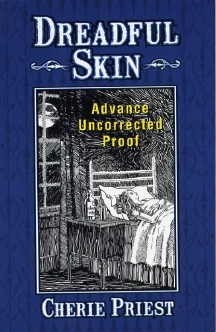
Cover (top) feaures an illsutration also found inside; another interior illustration (bottom). They're perfect.
In the interim, readers requiring more than a glimpse of the beyond can look to 'Dreadful Skin' (Subterranean Press ; March 1, 2007 ; $25), a bird of a different feather from the talented Priest. Priest's Eden Moore novels are merely, so to speak, drenched in history. 'Dreadful Skin' is in fact a historical triptych consisting of three novellas in which two characters circle round one another, drawn together by the changes wrought upon one when hunting in India. Jack Gabert returns to London, but soon enough finds that his condition leads him elsewhere; to America, and then to the South. He ends up on the steamboat Mary Byrd on the Tennessee River, where he meets Eileen Callaghan, a nun with a gun. And a secret. And the resolve to end Jack's life. One story at a time.
'Dreadful Skin' includes three novellas that hinge together following these two characters. "The Wreck of the Mary Byrd" affords us a glimpse of their meeting aboard a doomed steamboat, while "Halfway to Holiness" suggests that talking in tongues is not quite so consecrated as those who do so might have you believe. All that writhing, all that ... becoming. "Our Lady of the Wasteland and the Hallelujah Chorus" finds a wicked congregation on the road and seeking converts. In the sense that predators convert their food. A confrontation between two opposing forces impends.
'Dreadful Skin' is a beautiful book package, chock-full of wonderful period-style line drawings by Mark Geyer, a lot of them even though they hadn't all been completed at the time when the ARC was issued. Each panel of this triptych novel is preceded by a very authorly, Victorian-style introduction. One can easily see this coming out as three slim novellas in a series at the turn of the last century. Priest invests her narrative with a motherlode of historical minutia that keeps the narrative delightfully detailed. And the unique structure of the novel makes a perfect three-day read. At $25 for a hardcover edition, it seems like a deal to me, especially given the lovely illustrations.
I also get a very Victorian vibe from this novel. It seems rather similar to the work of writers like Gordon Dahlquist, Susanna Clarke and Jeffrey Barlough. These writers don’t just write about the Victorian time period (and I'm using "Victorian" to cover a wider range of history and historical fiction than that ruled by the Queen). No, instead, they write as if they are residing in the time period in which they write. This is a significant difference and one worth noting. I've written about "New Victoriana" before and the sub-genre stays remarkably busy. Priest is a natural for this sort of fiction and we're lucky to have her here. The tricks of the trade, when used sparingly and wisely, as here, make for a lovely little bit of fiction. It's possible that Priest shall not revisit this territory, but we hope she does. We shall watch her career unfold. This career too, is a tale worth following.
Something-Sucking Fiends
OK, so 'You Suck' by Christopher Moore doesn't suck. It's not perfect, but it surely doesn't suck. The review of the book is the first you're hearing about it here, because like, it was a NATIONAL BESTSELLER.
It has a bright blue cover with the words and title 'You Suck' on it, always guaranteed to get a rise out of the librarian. So, unless you were hiding under a rock, it's not like you needed me to tell you about it.
Granted, the world these days gives you hundreds, thousands of reasons to hide under a rock. Moore is not one of them. He won a Quill Award, he's a bestselling writer, and thank you very much we still can't write him off ourselves. When he's pretending to be a sixteen year-old girl, he's really in his element.
'You Suck' is clearly going to stand out in the Moore canon as the novel that give readers their first full glimpse of Abby Normal. The goth grrl who narrates chunks of the novel via her diary is so likable you want to hug her, in chapters with titles like "Being the Chronicles of Abby Normal: Competely Fucked Servant of the Vampire Flood". You can practically hear her reading them aloud to you. You wish.
So, here’s the lowdown. You want to read first 'Bloodsucking Fiends'. Then, read 'A Dirty Job'. Then, read 'You Suck'. Then cry, lonely clowns, cry. It’s going to be a while before we hear from Moore again. I just hope that when we do, he's feeling like a sixteen year-old girl.
03-12-07: A 2007 Interview with Jenn Ramage and Vendela Vida
Drinking Reindeer Blood
Late last year, I interviewed Heidi Julavits, and when we had a delightful discussion about her novel, 'The Uses of Enchantment', she told me about her co-editors at The Believer, Vendela Vida and Ed Park. Vida is herself a writer, with three titles to her name. Her first novel was 'And Now You Can Go', an odd concoction in which the heroine, Ellis, is held up by a man who ends up listening to her recite poetry. What follows is a descent into the details of violent crime victims, without the violence ever having been actually perpetrated -- at least by the gunman. Vida blows out her narrative when Ellis has creepy encounters not with criminals but roommates, and by sending Ellis off to travel. The book is short, to-the-point and rather powerful. Vida is a smart writer who leaves you wanting more.
She followed this up with 'Girls on the Verge' a fun, odd and rather sticks-to-you study of the habits and rituals of American girls trying to make the leap from girlhood to adulthood. 'Girls on the Verge' is sort of sociology that entertains as much as it informs, and that entertainment value is a key factor. The stuff that Vida talks about here is really pretty weird. These are the sorts of stories that get under your skin and bother you though they don’t suggest, from the look and sound of them anything particularly disturbing. But the sum of these stories is indeed disturbing, the sort of statistic that is not amenable to summaries, tables and graphs.
Vida's new novel is 'Let the Northern Lights Erase Your Name', and in her conversation with Jenn Ramage, she reveals that it is the second in a planned trilogy of novels that deal with travel, self-definition and violence. When I spoke to Heidi Julavits, I found her to be a really fun guest, always on the verge of laughter, and Jenn's conversations with Vida follows this model. Well, as much as you can laugh about drinking reindeer blood, which the intrepid Vida did in her traveling research for her new novel. I love these writers who get gigs writing novels that require them to travel hither and yon. It's got to be a great deal, even if it does on the off-occasion come down to drinking mammal blood from a cup.
You can download today's podcast in MP3 format, or in RealAudio format. You can also download a very short promo trailer in MP3 format, which includes a bit of background music in a style known as joiking. When I had to put together the radio version of this promo, I found myself faced with a seemingly difficult task. Rick Kleffel had to introduce the promo, but then I had to find a piece of the interview where Jenn Ramage spoke in a manner that clearly identified her as the interviewer, and then Vida had to respond in a manner that identified her as the interviewee; their voices were pretty similar. Then, I had to find some joiking music, which I did manage to find online. Fortunately, I was dealing with a skilled interviewer and a fascinating interviewee. It all fell together quite easily. And I'm not joiking.
